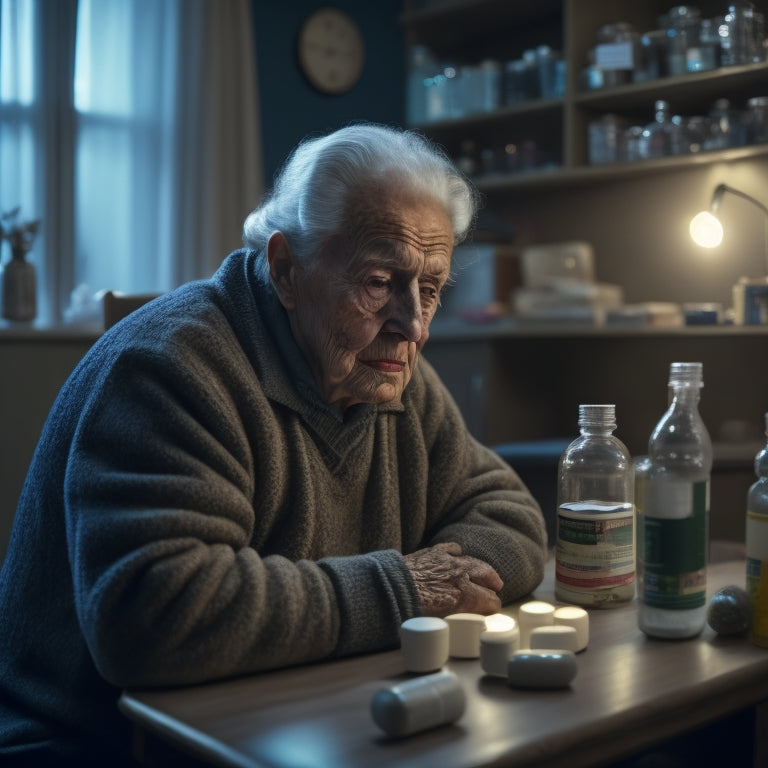
Protect Vulnerable Adults: Combat Abuse and Neglect
Share
As you care for a vulnerable adult, you bear an essential responsibility to safeguard them from abuse, neglect, and exploitation, which can have devastating and long-lasting consequences if left unchecked. Recognizing vulnerability factors, such as social isolation and emotional distress, is key to preventing abuse. By providing emotional support, promoting social connections, and implementing prevention strategies, you can create a safety net for them. It's also important to recognize signs of abuse, such as unexplained injuries and sudden behavioral changes. As you take the first steps towards protecting the vulnerable adult in your life, you'll discover how crucial it is to create a detailed plan that addresses their unique needs and empowers them to thrive.
Key Takeaways
• Recognize vulnerability factors, such as social isolation, to identify risks and provide targeted support to combat abuse and neglect.
• Foster a strong support network involving friends, family, and community resources to prevent isolation and promote emotional well-being.
• Implement prevention strategies, such as community engagement and advocacy, to shield vulnerable adults from harm and promote a safe environment.
• Educate vulnerable adults on self-care, abuse prevention, and resource navigation to empower them to make informed decisions and seek help when needed.
• Conduct thorough assessments of needs and living spaces to create a safe and supportive environment tailored to the individual's unique requirements.
Understanding Vulnerable Adults
Your elderly neighbor, who depends on you for daily care, may be more vulnerable to abuse, neglect, or exploitation than you realize. As a caregiver, it's crucial to understand the vulnerability factors that put them at risk.
Interventions such as providing emotional support, helping with daily tasks, and promoting social connections can make a significant difference. You can empower your neighbor by fostering a support network of friends, family, and community resources.
This network can help prevent isolation, which is a significant contributor to abuse and neglect. By understanding these factors and providing the right interventions, you can play a crucial role in protecting your neighbor from harm.
Prevention Strategies and Support
As you work to empower your neighbor, it's important to explore prevention strategies and support systems that can help shield them from abuse, neglect, and exploitation.
Community engagement and advocacy play a significant role in preventing abuse. By fostering a sense of community, you can help your neighbor build social connections and reduce feelings of isolation.
Strong family dynamics and open communication are also essential in preventing abuse. Encourage your neighbor to express their feelings and concerns, and be an active listener. By doing so, you can help identify potential issues before they escalate into abuse.
Recognizing and Reporting Abuse
If you suspect abuse, neglect, or exploitation, it's vital to recognize the signs and take prompt action to report it.
Identifying signs of abuse can be challenging, but it's important to know what to look for. Here are some key signs to watch out for:
-
Unexplained injuries, such as bruises or burns
-
Sudden changes in behavior, like withdrawal or agitation
-
Poor hygiene, malnutrition, or dehydration
- Unusual or sudden changes in financial situations
Safe and Effective Home Care
When considering home care for a vulnerable adult, it's important to conduct a thorough assessment of their needs to guarantee a safe and supportive environment. You'll want to evaluate their living space for accessibility, safety, and special requirements. This may involve home modifications, such as installing handrails or non-slip flooring, to reduce the risk of accidents.
Additionally, caregiver training is vital to make sure they can provide effective support. This training should cover topics like medication management, nutrition, and personal care. By taking these steps, you can create a safe and supportive environment that meets the vulnerable adult's unique needs.
Empowerment Through Education
Understanding the warning signs of abuse, neglect, and exploitation is crucial for empowering vulnerable adults to take control of their own lives and make informed decisions about their care. Education plays a vital role in empowerment, and it's critical to provide vulnerable adults with the knowledge and skills they need to advocate for themselves.
This can include:
-
Advocacy training: Teaching vulnerable adults how to communicate their needs and wants effectively.
-
Self-care education: Providing resources on healthy coping mechanisms and stress management.
-
Abuse prevention training: Educating vulnerable adults on the signs of abuse and how to report it.
- Resource navigation: Helping vulnerable adults access community resources and support services.
Frequently Asked Questions
Can I Take Legal Action if I'm Being Abused or Neglected?
"If you're being abused or neglected, know you have the right to take legal action. You can pursue civil litigation, seeking justice and compensation. Don't hesitate to explore your legal ramifications and seek help from authorities and support services."
How Do I Know if My Caregiver Is Trustworthy and Qualified?
To guarantee you're in good hands, you'll want to vet your caregiver by conducting thorough background checks and contacting their professional references, giving you peace of mind and confidence in their trustworthiness and qualifications.
Are There Support Groups Specifically for Abused or Neglected Adults?
You can find comfort in peer support groups, which offer a safe space to share experiences and connect with others who've faced similar situations. Online communities, like forums and social media groups, can also provide valuable resources and connections.
Can I Report Abuse or Neglect Anonymously to Protect Myself?
You can report abuse or neglect anonymously to protect yourself from fear of retaliation, and many organizations allow anon reporting, ensuring your safety while helping vulnerable adults receive necessary intervention and support.
Are There Any Laws That Protect Vulnerable Adults From Abuse?
"It's not a coincidence that you're looking for legal safeguards - you're not alone. You'll be relieved to know that laws, like the Elder Justice Act, provide protective measures to shield vulnerable adults from abuse and neglect, ensuring their safety and dignity."
Related Posts
-

Vintage Bathroom Storage Ideas for Large Families
You can easily boost your large family's bathroom with vintage storage ideas that marry style and function. Think rep...
-

Mastering Project Management Organization for Success
You know that mastering project management organization is essential for success, but it requires a strategic approac...
-

Revolutionize Your Kitchen With Shelfgenie Installation
I'm on a mission to revolutionize my kitchen with Shelfgenie installation, and I'm loving the results! With a seamles...


